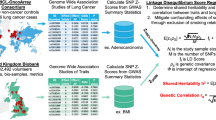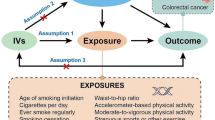Abstract
The aim of this study was to evaluate the relationship between smoking, alcohol drinking and genetic polymorphism of the growth hormone 1 gene (GH1) T1663A with reference to colorectal cancer. We conducted a case–control study with 315 cases of colorectal cancer and 438 population-based controls in the Jiangsu Province, China. GH1 T1663A genotypes were identified using PCR–RFLP (restriction fragment length polymorphism) methods. Information on smoking and drinking was collected using a questionnaire. Odds ratios (ORs) were estimated with an unconditional logistic model. The distribution of T/T and A/A genotypes was significantly different between controls and cases (χ2MH=3.877, P=0.049). Compared with the GH1 T/T genotype, the A/A genotype was at a decreased risk of developing colorectal cancer (sex-, age-, body mass index-, smoking- and alcohol drinking-adjusted OR=0.56, 95% confidence interval: 0.34–0.90). Smoking was not associated with the risk of colorectal cancer, whereas alcohol drinking was associated with an increased risk of colorectal cancer. Among nonsmokers or nondrinkers, individuals who had the GH1 A/A genotype were at a decreased risk of developing colorectal cancer compared with individuals who had the GH1 T allele. These results show that the GH1 T1663A A/A genotype can decrease the risk for colorectal cancer.
Similar content being viewed by others
Log in or create a free account to read this content
Gain free access to this article, as well as selected content from this journal and more on nature.com
or
References
Yu, H. & Rohan, T. Role of the insulin-like growth factor family in cancer development and progression. J. Natl Cancer Inst. 92, 1472–1489 (2000).
Yu, H., Spitz, M. R., Mistry, J., Gu, J., Hong, W. K. & Wu, X. F. Plasma levels of insulin-like growth factor-I and lung cancer risk: a case–control study. J. Natl Cancer Inst. 91, 151–156 (1999).
Holly, J. M., Gunnell, D. J. & Smith, G. Growth hormone, IGF-1 and cancer. Less intervention to avoid cancer? More intervention to prevent cancer? J. Endocrinol. 162, 321–330 (1999).
Ma, J., Pollak, M. N., Giovannucci, E., Chan, J. M., Tao, Y., Hennekens, C. H. et al. Prospective study of colorectal cancer risk in men and plasma levels of insulin-like growth factor (IGF)-I and IGF-binding protein-3. J. Natl Cancer Inst. 91, 620–625 (1999).
Giovannucci, E., Pollak, M. N., Platz, E. A., Willett, W. C., Stampfer, M. J., Majeed, N. et al. A prospective study of plasma insulin-like growth factor-1 and binding protein-3 and risk of colorectal neoplasia in women. Cancer Epidemiol. Biomarkers Prev. 9, 345–349 (2000).
Kaaks, R., Toniolo, P., Akhmedkhanov, A., Lukanova, A., Biessy, C., Dechaud, H. et al. Serum C-peptide, insulin-like growth factor (IGF)-I, IGF-binding proteins, and colorectal cancer risk in women. J. Natl Cancer Inst. 92, 1592–1600 (2000).
Jenkins, P. J., Fairclough, P. D., Richards, T., Lowe, D. G., Monson, J., Grossman, A. et al. Acromegaly, colonic polyps and carcinoma. Clin. Endocrinol. (Oxf) 47, 17–22 (1997).
Orme, S. M., McNally, R. J., Cartwright, R. A. & Belchetz, P. E. Mortality and cancer incidence in acromegaly: a retrospective cohort study. United Kingdom Acromegaly Study Group. J. Clin. Endocrinol. Metab. 83, 2730–2734 (1998).
Jenkins, P. J., Frajese, V., Jones, A. M., Camacho-Hubner, C., Lowe, D. G., Fairclough, P. D. et al. Insulin-like growth factor I and the development of colorectal neoplasia in acromegaly. J. Clin. Endocrinol. Metab. 85, 3218–3221 (2000).
Le Marchand, L., Donlon, T., Seifried, A., Kaaks, R., Rinaldi, S. & Wilkens, L. R. Association of a common polymorphism in the human GH1 gene with colorectal neoplasia. J. Natl Cancer Inst. 94, 454–460 (2002).
Hasegawa, Y., Fujii, K., Yamada, M., Igarashi, Y., Tachibana, K., Tanaka, T. et al. Identification of novel human GH-1 gene polymorphisms that are associated with growth hormone secretion and height. J. Clin. Endocrinol. Metab. 85, 1290–1295 (2000).
Khoury-Shakour, S., Gruber, S. B., Lejbkowicz, F., Rennert, H. S., Raskin, L., Pinchev, M. et al. Recreational physical activity modifies the association between a common GH1 polymorphism and colorectal cancer risk. Cancer Epidemiol. Biomarkers Prev. 17, 3314–3318 (2008).
Gao, C. M., Takezaki, T., Wu, J. Z., Chen, M. B., Liu, Y. T., Ding, J. H. et al. CYP2E1 Rsa I polymorphism impacts on risk of colorectal cancer associated with smoking and alcohol drinking. World J. Gastroenterol. 13, 5725–5730 (2007).
Gao, C. M., Takezaki, T., Wu, J. Z., Zhang, X. M., Cao, H. X., Ding, J. H. et al. Polymorphisms of alcohol dehydrogenase 2 and aldehyde dehydrogenase 2 and colorectal cancer risk in Chinese males. World J. Gastroenterol. 14, 5078–5083 (2008).
Kaklamani, V. G., Linos, A., Kaklamani, E., Markaki, I. & Mantzoros, C. Age, sex, and smoking are predictors of circulating insulin-like growth factor 1 and insulin-like growth factor-binding protein 3. J. Clin. Oncol. 17, 813–817 (1999).
Gapstur, S., Kopp, P., Chiu, B., Gann, P., Colangelo, L. & Liu, K. Longitudinal associations of age, anthropometric and lifestyle factors with serum total insulin-like growth factor-I and IGF binding protein-3 levels in black and white men: the CARDIA Male Hormone Study. Cancer Epidemiol. Biomarkers Prev. 13, 2208–2216 (2004).
Goodman-Gruen, D. & Barrett-Connor, E. Epidemiology of insulin-like growth factor-I in elderly men and women. The Rancho Bernardo Study. Am. J. Epidemiol. 145, 970–976 (1997).
Signorello, L. B., Kuper, H., Lagiou, P., Wuu, J., Mucci, L. A., Trichopoulos, D. et al. Lifestyle factors and insulin-like growth factor 1 levels among elderly men. Eur. J. Cancer Prev. 9, 173–178 (2000).
Lukanova, A., Toniolo, P., Akhmedkhanov, A., Hunt, K., Rinaldi, S., Zeleniuch-Jacquotte, A. et al. A cross-sectional study of IGF-I determinants in women. Eur. J. Cancer Prev. 10, 443–452 (2001).
Seyler, L. E. Jr, Pomerleau, O. F., Fertig, J. B., Hunt, D. & Parker, K. Pituitary hormone response to cigarette smoking. Pharmacol. Biochem. Behav. 24, 159–162 (1986).
Wilkins, J. N., Carlson, H. E., Van Vunakis, H., Hill, M. A., Gritz, E. & Jarvik, M. E. Nicotine from cigarette smoking increases circulating levels of cortisol, growth hormone, and prolactin in male chronic smokers. Psychopharmacology (Berl) 78, 305–308 (1982).
Acknowledgements
This study was supported in part by a Grant-in Aid for International Scientific Research; Special Cancer Research from the Ministry of Education, Science, Sports, Culture and Technology of Japan, No. 11 137 311; and Major International (Regional) Joint Research Projects from the National Natural Science Foundation of China (NSFC), No. 30 320 140 461. We thank the staff of the Huaian City Municipal Hospital and Public Health Center of Huaian and Jintan Cities for their assistance in data collection.
Author information
Authors and Affiliations
Corresponding author
Rights and permissions
About this article
Cite this article
Gao, CM., Gong, JP., Wu, JZ. et al. Relationship between growth hormone 1 genetic polymorphism and susceptibility to colorectal cancer. J Hum Genet 55, 163–166 (2010). https://doi.org/10.1038/jhg.2010.3
Received:
Revised:
Accepted:
Published:
Issue date:
DOI: https://doi.org/10.1038/jhg.2010.3



